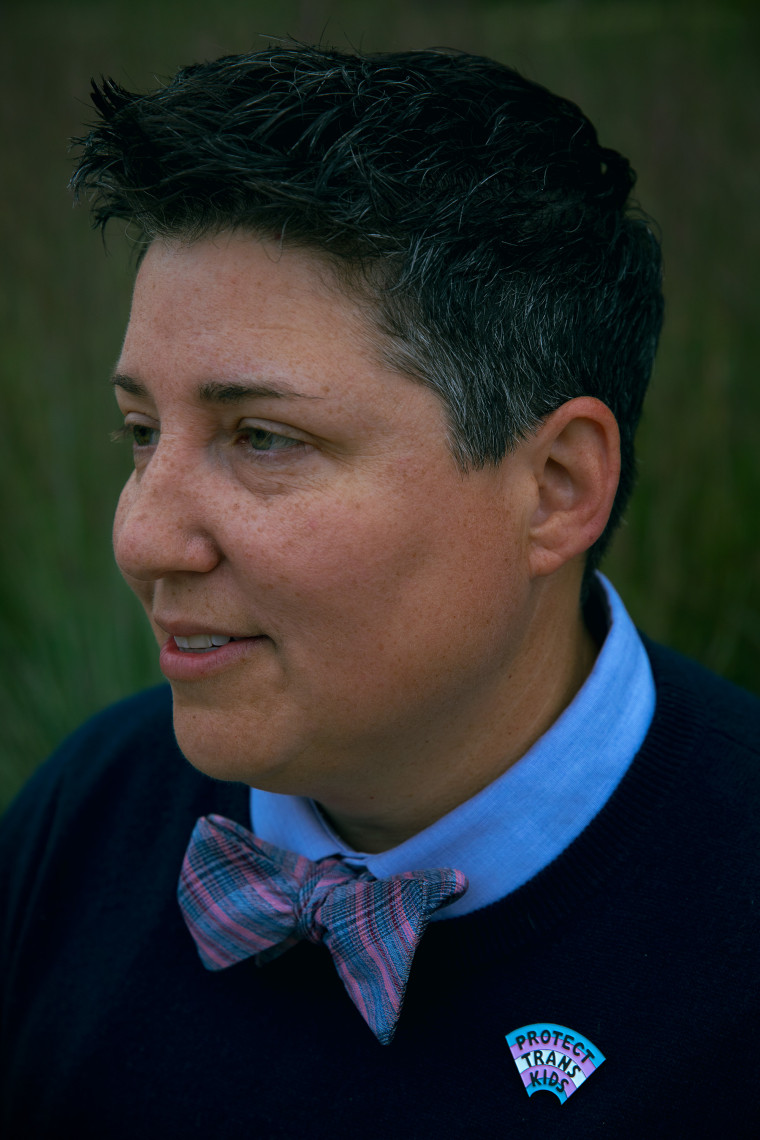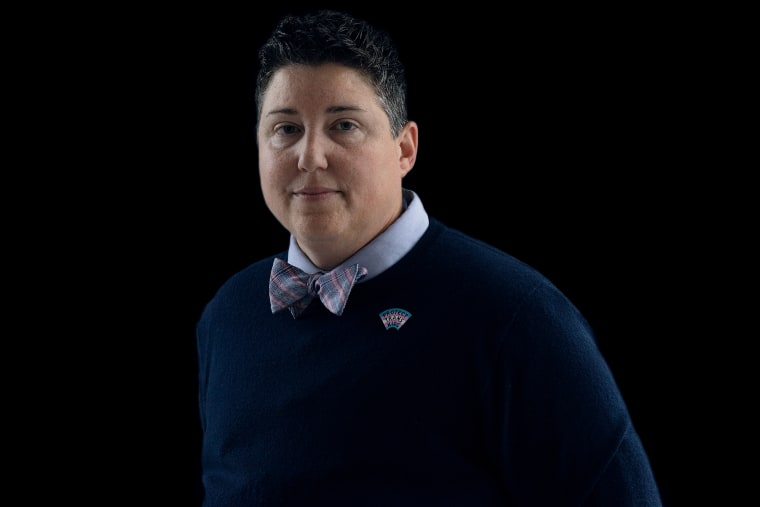Member support made it possible for us to write this series. Donate to our nonprofit newsroom today to support independent journalism that represents you.
In Kansas, lawyers for the American Civil Liberties Union have drafted a letter reminding election workers that a gender marker on a person’s identification does not need to match or correspond to a voter’s gender expression. Staff for the organization have also held clinics elsewhere to prepare trans Americans for the identification requirements they will have to navigate.
In eight battleground states, the nonprofit VoteRiders is on the ground helping voters get the identification they need to cast ballots in the November election — and one that reflects who they are.
Equality Florida, the state’s leading LGBTQ+ advocacy group, is holding “know your rights” trainings in the wake of new regulations barring many transgendervoters from obtaining photo identification that reflects their gender.
As Republican politicians push anti-transgender rhetoric ahead of a historic election, transgender and nonbinary Americans are facing new laws and rules that effectively prohibit them and others from obtaining documentation like birth certificates and driver’s licenses that align with their gender identities.
Advocates are fighting back. They’ve been mobilizing communities and organizing resources to help transgender Americans, an effort aimed at safeguarding their civic rights. Some trans voters have expressed confusion and fear of discrimination at the ballot box that could discourage them from participating in public life.
“There is a chilling effect,” said Lauren Kunis, CEO and executive director of VoteRiders, which helps voters obtain identification. “There is an unsafe and intimidating environment around existing as trans in society, and definitely in being able to go to the polls safely and cast a ballot.”
The ripple effect could extend beyond trans people, these advocates warn. Regulations around gender impact cisgender people, particularly women and women of color. America’s decentralized elections system relies on a temporary workforce tasked with enforcing varying policies around identification rules. In states that require voters to “reasonably resemble” the picture on their ID, like North Carolina and Wisconsin, the results could ensnare anyone at the ballot box who doesn’t fit the binary concept of masculinity and femininity traits.
“A lot is falling on poll workers to correctly enforce the law,” Kunis added. “And I would argue that is less of a solid protection in states where anti-trans rhetoric is skyrocketing.”
The measures often focus on sex classification that narrowly defines an individual’s sex as either male or female at birth. They’re among a broad scope of anti-trans legislation that have popped up in Republican-led statehouses in recent years and served as breeding ground for the binary vision of the country embraced by former President Donald Trump and U.S. Sen. JD Vance, his running mate on the Republican ticket. At least nine states in the past two years have explicitly regulated gender in this way, according to a tally by the Movement Advancement Project (MAP), which tracks LGBTQ+ policy.
And it’s not just laws. Last year, Nebraska’s governor issued a related executive order. In January, a Florida agency announced it would no longer update a trans person’s driver’s license with their correct gender identity. In August, at least one Texas agency, under directive from the state attorney general’s office, implemented a similar policy.
Anti-transgender rhetoric was front and center at the Republican National Convention in July, and Trump has taken to verbally targeting transgender people in his campaign. He described Democratic vice presidential nominee Tim Walz recently as “very heavy into the transgender world.”
The verbal attacks are against a group that is highly invested in electoral politics. An analysis released in August of respondents to the 2022 U.S. Transgender Survey, widely seen as the most comprehensive study of binary and nonbinary transgender Americans, found that voting-eligible trans people had cast ballots in the last presidential election at a higher rate than the U.S. population. The study included more than 92,000 respondents, including more than 84,000 adults who were 18 and older.
“Trans votes count,” said Ankit Rastogi, director of research for the National Center for Transgender Equality, which conducted the survey and will soon be known as Advocates for Trans Equality Education Fund. “I think the big takeaway is that our community is really trying to come out and make a difference through the democratic process.”
The new laws and rules around sex classification vary widely. Those that intentionally target government identification that people use in everyday life, like driver’s licenses, are particularly challenging. Forcing a person to show identification that does not align with their gender identity could out them to people in their community, as Lucas Cameron-Vaughn, an attorney for the ACLU of Tennessee, explained.
“Trans people, just like everyone else, want to be able to travel, start new jobs, open bank accounts, enroll in school, vote — all of those things require some form of ID. And so when a state goes out of its way to enforce its message about its belief about sex and gender on a license, and transgender people then have to publicize that when they show other people, it creates a dangerous environment,” he said.
Last year, Tennessee Gov. Bill Lee, a Republican, signed a bill into law that defines sex as “determined by anatomy and genetics existing at the time of birth.” The state’s Department of Safety and Homeland Security then created a rule banning transgender people from changing gender markers on their driver’s licenses. The ACLU sued the agency for discrimination, claiming the rule was adopted illegally because it didn’t follow proper administrative procedure.
Like with other laws targeting transgender people, including bans on transgender student-athletes from participating in women’s sports, politicians supporting these policies frame them as protecting cisgender women.
“It’s a tactic that’s designed to splinter support for trans rights and suggest sort of who is harmed by protecting trans people — to frame that as cisgender women being the people harmed by protections for trans people,” said Rose Saxe, who is deputy project director for the ACLU’s LGBT & HIV Project.
Nearly 21 million voting-eligible U.S. citizens do not have a current driver’s license, according to the Center for Democracy and Civic Engagement at the University of Maryland, whose research was partially supported by VoteRiders. Black and Hispanic people are among those most likely not to have a current license, so the requirement harms them too, regardless of their gender identity.
In the 2024 election, 38 states will require voters to show some form of identification at the polls, including 17 states that have new or stricter ID laws passed since 2020.
The full impact of these laws amid new and evolving voter identification laws is not yet clear, in part because of how recent they are — and that, experts say, could mask their harm. The Williams Institute at the University of California, Los Angeles School of Law, estimated ahead of the 2022 midterm election that more than 200,000 voting-eligible transgender Americans may find it difficult to vote at the time because of voter ID laws.
But these don’t just affect transgender people. In many red states, Republican-led attacks on transgender people are going hand-in-hand with new identification requirements and other laws that pose barriers to the ballot that reach beyond gender lines.
“The states with the anti-trans laws are also the ones that are more likely to be passing anti-voter laws, full stop,” Kunis said.
In Florida, which has emerged as a national epicenter of policies targeting LGBTQ+ people in recent years, the state’s Department of Highway Safety and Motor Vehicles issued a new regulation barring residents from updating their gender identity on their drivers’ license.
To Quinn Diaz, a public policy associate at advocacy group Equality Florida, the failure of most anti-LGBTQ+ bills introduced in this year’s legislative session showed that the tide in Florida is turning. But the new gender marker regulation signals yet another way that state agencies in Florida have overstepped their bounds and been “weaponized” to target transgender Floridians, they argued.
“We saw it as a move to inflict maximum chaos and misunderstanding,” Diaz said. “And really to scare trans folks from even participating and getting the license if they needed to update it.”
Even before the introduction of such regulations, transgender people around the country have had to jump through logistical and administrative hoops to get an affirming identification.
For transgender people, lacking identification that reflects their gender identity and appearance can make them vulnerable to discrimination in everyday situations at a bar or liquor store, for example, and in interactions with law enforcement and at the polls.
“With these laws in Florida, you’re forced to choose between living authentically and just not really participating in public life,” Diaz said.
Diaz, who is transgender, moved to Florida from Massachusetts, where they had an “X” gender marker on their driver’s license. Because they didn’t have all the necessary documentation and weren’t established yet with a local provider when they transferred their license to Florida, they forfeited that marker and defaulted to a license with their sex assigned at birth.
Diaz said they didn’t have any problems voting in person in the 2022 midterms, but they plan to vote by mail this November.
“I can imagine that a lot of trans folks in Florida who might not have access … to an accurate and affirming ID might not want to engage in that process at all, especially in such a heightened political environment,” Diaz said.
Such rhetoric could also be most dangerous in states where far-right groups are trying to recruit poll watchers. Since 2020, many Republican-controlled states have passed laws expanding the authority of those temporary election observers who work elections under certain rules and may feel compelled to stop someone from voting under the guise of stopping widespread election fraud, which has been repeatedly debunked.
“Gender nonconforming people are already under such public scrutiny nationwide,” Diaz said. “That’s when you’re gonna see the convergence of those two elements. It really seems like it would only result in more discrimination, more discomfort for trans people, more interrogation and potentially just being turned away.”
Hazel Krebs, a 42-year-old transgender woman living in Kansas, one of the states with a new anti-trans law, felt the weight of that increased scrutiny as she cast her ballot in March. Krebs wondered whether her identification — one that for weeks no longer reflected her gender identity — might impact her ability to vote.
She chatted with the election workers in the mostly empty precinct, then showed her ID. She did her homework, learned that gender is not required information to vote and showed up ready to explain it.
But no one questioned her. Krebs voted and was out of the polling site within minutes. Still, she worries that, under the same circumstances, another trans person might have stayed home.
“They won’t stop me, but I can see how it would stop others,” she said. “It is almost certainly stopping some people from showing up at the polls.”
The ACLU, which is tracking some of these laws and rules, has tried to prepare election workers on how to process trans voters who come into their polling sites. VoteRiders is conducting year-round voter education. While the driver’s license is the most ubiquitous form of identification in the United States’ car-centric society, Kunis wants to dispel the “common misconception” that it’s the only form of ID people can use to vote.
Trans voters can obtain a U.S. passport or passport card that reflects their gender identity without needing to provide underlying documentation. However, that option may not be accessible to people who struggle to pay the related fees or may not have the time or knowledge required to fill out the forms and request the passport.
It’s also a temporary solution if a future presidential administration rescinds the ability for people to self-attest their gender on their passports. Some advocacy groups and lawmakers in Florida also argue the state’s new regulations conflict with the federal Real ID Act, but that question is unlikely to be resolved before November.
In addition to using passports as identification, Diaz said that Florida voters have the option to vote by mail, vote early in person and bring a friend or family member to the polls.
“Our ability to participate in this democracy in Florida, it’s been on the line for a while,” Diaz said. Transgender people, they said, are being “forced to choose between participating in our greatest civic right or just sitting out because the state doesn’t see us for who we are.”
It’s still unclear how many trans people will be denied affirming identification — and how many will choose not to vote — as a result of these new regulations. Several of the new laws are written with no clear penalties.
“Something that’s very frustrating for us at VoteRiders is you will never be able to capture the number of people who do not feel safe voting, and who therefore stay home. And you also won’t be able to capture the people who are trans and show up to try and vote and are turned away.” Kunis said. “And we know that is happening, but it is difficult to quantify.”
Cameron-Vaughn said he also worries about a scenario where a trans person is stopped at a polling place because of mismatching information on their identification and must fill out a provisional ballot — a voting option that often requires a person to return at a later date with more documentation to ensure their vote is counted.
“There are definitely the physical dangers, the dangers for harassment, discrimination — but also ultimately, voter suppression,” he said.
Josie Caballero, director of voting and elections for the group that conducted the 2022 U.S. Transgender Survey, said it’s important to remember that barriers to voting existed for trans people before the latest slate of laws and rules targeting sex classification, particularly around voter ID rules. Trans people turned out to vote despite those policy roadblocks.
“It really shows the resiliency of the trans community to ensure that our voices are heard and we have visibility at the ballot box,” she said.
Krebs, who plans to vote in November, is worried about how the dynamics of a crowded polling site might impact her ability to vote. But she is determined to access the ballot, and to stay in Kansas despite the heightened scrutiny.
“There’s nothing these laws will do to stop me from living my best life,” she said. “It just puts my energy and passion towards making this place better for me and other trans people.”





